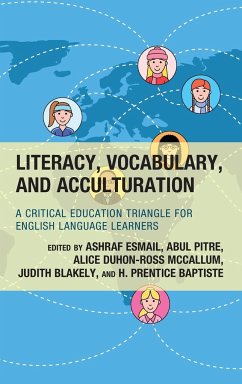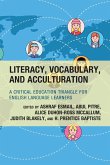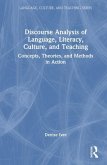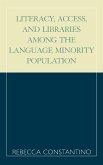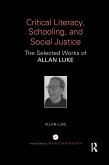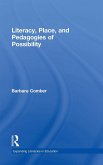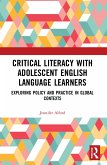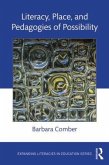Literacy, Vocabulary, and Acculturation
A Critical Education Triangle for English Language Learners
Herausgeber: Esmail, Ashraf; McCallum, Alice Duhon-Ross; Pitre, Abul
Literacy, Vocabulary, and Acculturation
A Critical Education Triangle for English Language Learners
Herausgeber: Esmail, Ashraf; McCallum, Alice Duhon-Ross; Pitre, Abul
- Gebundenes Buch
- Merkliste
- Auf die Merkliste
- Bewerten Bewerten
- Teilen
- Produkt teilen
- Produkterinnerung
- Produkterinnerung
This book provides strong, diverse context that supports educators in driving theory to practice when engaging with English Language Learners.
Andere Kunden interessierten sich auch für
![Literacy, Vocabulary, and Acculturation Literacy, Vocabulary, and Acculturation]() Literacy, Vocabulary, and Acculturation45,99 €
Literacy, Vocabulary, and Acculturation45,99 €![Discourse Analysis of Language, Literacy, Culture, and Teaching Discourse Analysis of Language, Literacy, Culture, and Teaching]() Denise IvesDiscourse Analysis of Language, Literacy, Culture, and Teaching204,99 €
Denise IvesDiscourse Analysis of Language, Literacy, Culture, and Teaching204,99 €![Literacy, Access, and Libraries Among the Language Minority Community Literacy, Access, and Libraries Among the Language Minority Community]() Rebecca ConstantinoLiteracy, Access, and Libraries Among the Language Minority Community101,99 €
Rebecca ConstantinoLiteracy, Access, and Libraries Among the Language Minority Community101,99 €![Critical Literacy, Schooling, and Social Justice Critical Literacy, Schooling, and Social Justice]() Allan LukeCritical Literacy, Schooling, and Social Justice63,99 €
Allan LukeCritical Literacy, Schooling, and Social Justice63,99 €![Literacy, Place, and Pedagogies of Possibility Literacy, Place, and Pedagogies of Possibility]() Barbara ComberLiteracy, Place, and Pedagogies of Possibility227,99 €
Barbara ComberLiteracy, Place, and Pedagogies of Possibility227,99 €![Critical Literacy with Adolescent English Language Learners Critical Literacy with Adolescent English Language Learners]() Jennifer AlfordCritical Literacy with Adolescent English Language Learners204,99 €
Jennifer AlfordCritical Literacy with Adolescent English Language Learners204,99 €![Literacy, Place, and Pedagogies of Possibility Literacy, Place, and Pedagogies of Possibility]() Barbara ComberLiteracy, Place, and Pedagogies of Possibility75,99 €
Barbara ComberLiteracy, Place, and Pedagogies of Possibility75,99 €-
-
-
This book provides strong, diverse context that supports educators in driving theory to practice when engaging with English Language Learners.
Hinweis: Dieser Artikel kann nur an eine deutsche Lieferadresse ausgeliefert werden.
Hinweis: Dieser Artikel kann nur an eine deutsche Lieferadresse ausgeliefert werden.
Produktdetails
- Produktdetails
- Verlag: Rowman & Littlefield Publishers
- Seitenzahl: 186
- Erscheinungstermin: 25. Mai 2023
- Englisch
- Abmessung: 235mm x 157mm x 15mm
- Gewicht: 429g
- ISBN-13: 9781475872613
- ISBN-10: 1475872615
- Artikelnr.: 67293490
- Herstellerkennzeichnung
- Libri GmbH
- Europaallee 1
- 36244 Bad Hersfeld
- gpsr@libri.de
- Verlag: Rowman & Littlefield Publishers
- Seitenzahl: 186
- Erscheinungstermin: 25. Mai 2023
- Englisch
- Abmessung: 235mm x 157mm x 15mm
- Gewicht: 429g
- ISBN-13: 9781475872613
- ISBN-10: 1475872615
- Artikelnr.: 67293490
- Herstellerkennzeichnung
- Libri GmbH
- Europaallee 1
- 36244 Bad Hersfeld
- gpsr@libri.de
Ashraf Esmail is an associate professor and program coordinator of criminal justice at Dillard University. He is the Director for the Center for Racial Justice and Barron Hilton Criminal Justice Endowed Professor. Abul Pitre is professor and department chair of Africana Studies at San Francisco State University. He was appointed Edinboro University's first named professor for his outstanding work in African American education and held the distinguished title of Carter G. Woodson Professor of Education. Alice Duhon Ross is a core faculty for the Richard W. Riley College of Education at Walden University. She is a career educator with over thirty years of teaching in higher education and is a Nationally Board-Certified Counselor and National Board-Certified School Counselor. Judith Blakely is an educational specialist. She is certified in multiple states as a school superintendent, school administrator (pre-K-12 principal), and director of special, bilingual, and gifted education. H. Prentice Baptiste is a Regents and Distinguished Achievement Professor, and in 2014 was awarded the first College of Education, Diversity Award at New Mexico State University.
Introduction Using Your Authentic Voice Through Language, by Camacia
Smith-Ross
Acknowledgements
Chapter 1Beyond the Strategies: Supporting English Language Learners, by
David Parker
Chapter 2Negotiating Possibilities for Teaching English Learners: A
Critical Conversation Between Language Separation and Translanguaging, by
Kevin Donley
Chapter 3Improving Mathematics Outcomes for English Language Learners
Through Implementation of the Elementary Mathematics Initiative, by Cliff
Chestnutt and Andrea Smith
Chapter 4Evolving the Language We Use: Interrupting Deficit Narratives
About Multilingual Learners and Emergent Bilingual Students, by Leah M.
Mortenson
Chapter 5English Language Bilingualism, by Judith A. Orth and Kathleen M.
Hargiss
Chapter 6Positioning English Language Learners for Mathematical Success, by
Erin Smith
Chapter 7Educational Journeys: Youth Voices as the Impetus for Social
Justice Curriculum in Latinx Multilingual Classrooms, by Rubén A. González
Chapter 8Linking Multicultural Education With Best Practices for
Multilingual Students, by Renee Shank and Lin Wu
Chapter 9Beyond Language: A Sociocultural Approach to K-12 English Language
Teaching and Learning, by Immaculée Harushimana
Chapter 10Becoming "Talent Scouts": Identifying Gifted Potential in English
Learners, by Holly D. Glaser and Erica C. Meadows
Chapter 11Introducing Translanguaging as Pedagogy: Unpacking Preservice ESL
Teachers' Language Ideologies and Practices, by Nuo Xu and Verónica E.
Valdez
Chapter 12Characteristics of English Language Learners, by Nan Li and
Courtney A. Howard
Chapter 13A Need for Taiwanese Indigenous Immigrant Literature, by
Hsiao-Ching Lin and Antonette Aragón
Chapter 14Lessons and Transformations From the Borderlands: Preparing
Educators to Support Emerging Bilinguals, by Michele L. McConnell and Kelly
Metz-Matthews
Chapter 15Strategies for Moving From Learning English, Bilingual Education
to a More Inclusive Multilingual Education, by Georgina Y. García and Jan
Perry Evenstad
Chapter 16Real Teachers Teaching Real Students: Where Theory Meets
Practice-Learning English in Secondary Schools, by Glori Hodge Smith
Chapter 17Creating Social Change for English Language Learners by Improving
Access to Grade-Level Instruction, by Charity Funfe Tatah Mentan, Darrell
Peterson, Yi-Chen Wu, Kristin Kline Liu, and Kym O'Donnell
Chapter 18Binds and Unravels: Science Teachers Deepening Learning for
English Language Learners, by Analis Carattini-Ruiz
About the Contributors
About the Editors
Smith-Ross
Acknowledgements
Chapter 1Beyond the Strategies: Supporting English Language Learners, by
David Parker
Chapter 2Negotiating Possibilities for Teaching English Learners: A
Critical Conversation Between Language Separation and Translanguaging, by
Kevin Donley
Chapter 3Improving Mathematics Outcomes for English Language Learners
Through Implementation of the Elementary Mathematics Initiative, by Cliff
Chestnutt and Andrea Smith
Chapter 4Evolving the Language We Use: Interrupting Deficit Narratives
About Multilingual Learners and Emergent Bilingual Students, by Leah M.
Mortenson
Chapter 5English Language Bilingualism, by Judith A. Orth and Kathleen M.
Hargiss
Chapter 6Positioning English Language Learners for Mathematical Success, by
Erin Smith
Chapter 7Educational Journeys: Youth Voices as the Impetus for Social
Justice Curriculum in Latinx Multilingual Classrooms, by Rubén A. González
Chapter 8Linking Multicultural Education With Best Practices for
Multilingual Students, by Renee Shank and Lin Wu
Chapter 9Beyond Language: A Sociocultural Approach to K-12 English Language
Teaching and Learning, by Immaculée Harushimana
Chapter 10Becoming "Talent Scouts": Identifying Gifted Potential in English
Learners, by Holly D. Glaser and Erica C. Meadows
Chapter 11Introducing Translanguaging as Pedagogy: Unpacking Preservice ESL
Teachers' Language Ideologies and Practices, by Nuo Xu and Verónica E.
Valdez
Chapter 12Characteristics of English Language Learners, by Nan Li and
Courtney A. Howard
Chapter 13A Need for Taiwanese Indigenous Immigrant Literature, by
Hsiao-Ching Lin and Antonette Aragón
Chapter 14Lessons and Transformations From the Borderlands: Preparing
Educators to Support Emerging Bilinguals, by Michele L. McConnell and Kelly
Metz-Matthews
Chapter 15Strategies for Moving From Learning English, Bilingual Education
to a More Inclusive Multilingual Education, by Georgina Y. García and Jan
Perry Evenstad
Chapter 16Real Teachers Teaching Real Students: Where Theory Meets
Practice-Learning English in Secondary Schools, by Glori Hodge Smith
Chapter 17Creating Social Change for English Language Learners by Improving
Access to Grade-Level Instruction, by Charity Funfe Tatah Mentan, Darrell
Peterson, Yi-Chen Wu, Kristin Kline Liu, and Kym O'Donnell
Chapter 18Binds and Unravels: Science Teachers Deepening Learning for
English Language Learners, by Analis Carattini-Ruiz
About the Contributors
About the Editors
Introduction Using Your Authentic Voice Through Language, by Camacia
Smith-Ross
Acknowledgements
Chapter 1Beyond the Strategies: Supporting English Language Learners, by
David Parker
Chapter 2Negotiating Possibilities for Teaching English Learners: A
Critical Conversation Between Language Separation and Translanguaging, by
Kevin Donley
Chapter 3Improving Mathematics Outcomes for English Language Learners
Through Implementation of the Elementary Mathematics Initiative, by Cliff
Chestnutt and Andrea Smith
Chapter 4Evolving the Language We Use: Interrupting Deficit Narratives
About Multilingual Learners and Emergent Bilingual Students, by Leah M.
Mortenson
Chapter 5English Language Bilingualism, by Judith A. Orth and Kathleen M.
Hargiss
Chapter 6Positioning English Language Learners for Mathematical Success, by
Erin Smith
Chapter 7Educational Journeys: Youth Voices as the Impetus for Social
Justice Curriculum in Latinx Multilingual Classrooms, by Rubén A. González
Chapter 8Linking Multicultural Education With Best Practices for
Multilingual Students, by Renee Shank and Lin Wu
Chapter 9Beyond Language: A Sociocultural Approach to K-12 English Language
Teaching and Learning, by Immaculée Harushimana
Chapter 10Becoming "Talent Scouts": Identifying Gifted Potential in English
Learners, by Holly D. Glaser and Erica C. Meadows
Chapter 11Introducing Translanguaging as Pedagogy: Unpacking Preservice ESL
Teachers' Language Ideologies and Practices, by Nuo Xu and Verónica E.
Valdez
Chapter 12Characteristics of English Language Learners, by Nan Li and
Courtney A. Howard
Chapter 13A Need for Taiwanese Indigenous Immigrant Literature, by
Hsiao-Ching Lin and Antonette Aragón
Chapter 14Lessons and Transformations From the Borderlands: Preparing
Educators to Support Emerging Bilinguals, by Michele L. McConnell and Kelly
Metz-Matthews
Chapter 15Strategies for Moving From Learning English, Bilingual Education
to a More Inclusive Multilingual Education, by Georgina Y. García and Jan
Perry Evenstad
Chapter 16Real Teachers Teaching Real Students: Where Theory Meets
Practice-Learning English in Secondary Schools, by Glori Hodge Smith
Chapter 17Creating Social Change for English Language Learners by Improving
Access to Grade-Level Instruction, by Charity Funfe Tatah Mentan, Darrell
Peterson, Yi-Chen Wu, Kristin Kline Liu, and Kym O'Donnell
Chapter 18Binds and Unravels: Science Teachers Deepening Learning for
English Language Learners, by Analis Carattini-Ruiz
About the Contributors
About the Editors
Smith-Ross
Acknowledgements
Chapter 1Beyond the Strategies: Supporting English Language Learners, by
David Parker
Chapter 2Negotiating Possibilities for Teaching English Learners: A
Critical Conversation Between Language Separation and Translanguaging, by
Kevin Donley
Chapter 3Improving Mathematics Outcomes for English Language Learners
Through Implementation of the Elementary Mathematics Initiative, by Cliff
Chestnutt and Andrea Smith
Chapter 4Evolving the Language We Use: Interrupting Deficit Narratives
About Multilingual Learners and Emergent Bilingual Students, by Leah M.
Mortenson
Chapter 5English Language Bilingualism, by Judith A. Orth and Kathleen M.
Hargiss
Chapter 6Positioning English Language Learners for Mathematical Success, by
Erin Smith
Chapter 7Educational Journeys: Youth Voices as the Impetus for Social
Justice Curriculum in Latinx Multilingual Classrooms, by Rubén A. González
Chapter 8Linking Multicultural Education With Best Practices for
Multilingual Students, by Renee Shank and Lin Wu
Chapter 9Beyond Language: A Sociocultural Approach to K-12 English Language
Teaching and Learning, by Immaculée Harushimana
Chapter 10Becoming "Talent Scouts": Identifying Gifted Potential in English
Learners, by Holly D. Glaser and Erica C. Meadows
Chapter 11Introducing Translanguaging as Pedagogy: Unpacking Preservice ESL
Teachers' Language Ideologies and Practices, by Nuo Xu and Verónica E.
Valdez
Chapter 12Characteristics of English Language Learners, by Nan Li and
Courtney A. Howard
Chapter 13A Need for Taiwanese Indigenous Immigrant Literature, by
Hsiao-Ching Lin and Antonette Aragón
Chapter 14Lessons and Transformations From the Borderlands: Preparing
Educators to Support Emerging Bilinguals, by Michele L. McConnell and Kelly
Metz-Matthews
Chapter 15Strategies for Moving From Learning English, Bilingual Education
to a More Inclusive Multilingual Education, by Georgina Y. García and Jan
Perry Evenstad
Chapter 16Real Teachers Teaching Real Students: Where Theory Meets
Practice-Learning English in Secondary Schools, by Glori Hodge Smith
Chapter 17Creating Social Change for English Language Learners by Improving
Access to Grade-Level Instruction, by Charity Funfe Tatah Mentan, Darrell
Peterson, Yi-Chen Wu, Kristin Kline Liu, and Kym O'Donnell
Chapter 18Binds and Unravels: Science Teachers Deepening Learning for
English Language Learners, by Analis Carattini-Ruiz
About the Contributors
About the Editors

